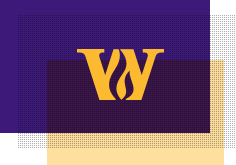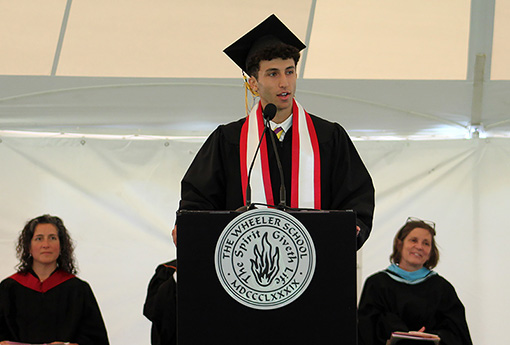
2019 Opening School Year Assembly Speech
September 11, 2019
Opening Remarks for Students, 2019-20
Welcome and welcome back!
Today, we welcome 130 new students to our school, including the nursery students behind me. Today, we welcome our senior class to their final year at Wheeler, having watched many go before them, launching their last year with us. 16 of them have been with us since they were in kindergarten or before. I’m so happy to see all of your faces. Welcome.
First, let’s conjure up some gratitude for all of the many people it takes to make a school like Wheeler tick. From Sage and our warm and welcoming food services staff to all of the administrators and staff members who make sure that all the trains run on time to our maintenance colleagues who have been working all summer in all kinds of heat to keep the school gleaming and shining as it does. We also have construction professionals who completed – in the nick of time – the beautiful Hope Building and worked nights and weekends to put everything back together to start school. We have faculty and staff members who have been learning all summer at conferences and workshops, or with each other to make the curriculum even more dynamic, or on creating your individual schedules and or readying our classrooms. We have admissions colleagues and mentor families who welcomed new families to the area. We have our IT department to thank that our old laptops are repaired and new phones are working, who make sure that all of our technology is up to date to support the important learning we’ll do this year. We are grateful that Breakthrough Providence brought so many students to campus this summer to keep it vibrant and filled with learning and community as we do during the rest of the year. We are grateful to the summer camp staff and leadership – what a fun summer it was at the Farm with over 700 campers in attendance! We are grateful to those who worked with educators from across Rhode Island who came to learn about learning differences from the experts at our Hamilton School. So much has to happen during the summer to make our opening days seamless; we have much to be thankful for. And of course, we have all of the family members who aren’t here with us at school to thank for making the choice to bring us together this year once again. Let’s give a round of applause to all of those people.
Mrs. Bomba (for our new students, Mrs. Bomba raise your hand – she is the Director of our Unity and Diversity program) told me earlier this summer that this year’s Unity and Diversity theme would be “Justice in Action” and as the summer came to a close, I thought that this would be the perfect theme on which to open the year.
Justice, as most of you know, is about things being fair, about equity and righteousness. “Justice,” said Harvard Professor Cornel West, “is what love looks like in public.” It is the way in which we know what is right, sometimes intuitively, and sometimes with direction. Justice happens in very local ways here at school – such as intervening on behalf of a classmate or a younger student. More broadly, justice helps us ensure that we can be free to be who we are, that we can feel safe, that we are treated equally under the law and within our community. The idea of justice can help us strive for a more perfect union in our school, our country, and our world.
But the word justice is a noun; without any verb or action word by its side, it stands alone, in some ways at arms’ distance. Justice in Action, our chosen theme for this year, is something quite different. It reminds us that justice happens as a result of action. To make it real, we have to strive for it, live it, inhabit it in our bodies and souls. So, how do we do that? How will we do that this year?
I’ve enlisted some help from those who are poised to offer thoughts on the subject, namely Wheeler students (of course), and a poet and gardener named Ross Gay, whose work I came upon this summer.
Justice in action means listening with great care. One now-graduate of Wheeler reminded us last fall that “Listening is a really undervalued skill. There’s a difference between listening genuinely and just hearing what someone is saying… We need [people] to not only offer solutions, but to really understand what we are saying.” So let’s heed her advice and be very good listeners in the service of justice this year. When a friend is in need or needs to be heard, focus in on their eyes and their face, or sit next to them in silence, and really listen. Put yourself in their shoes. Do this even when it is an argument between the two of you about something personal or academic. In most disagreements between people, there is something true to be learned on both sides. When you see something that seems unjust, try to delve deeper into the problem and understand where it comes from, listen to the people involved and question for yourself what you think the right path forward it. Read more. Find more voices. Figure out who needs to be included, even when, maybe especially when you disagree. And when you listen, listen patiently, and try to show younger children (even if you are among our youngest here today) how to do this as well. Last spring, our then-juniors spoke about how they wanted to be known in their now senior year, and one of their goals was to be role models. Let’s take a cue from them and be role models in listening to each other this year.
Justice in action also means living our mission. Another wise comment from a Wheeler student: “I ask [us] to think about how you can use your power,” she said, “to see what is going on with people who don’t have as much power as [we] do. If someone needs help, how can I offer it to them?” On a similar theme, the wonderful novelist Toni Morrison who passed away this summer said “just remember that your real job is that if you are free, you need to free somebody else. If you have some power, then your job is to empower somebody else.” Use what you have – your sense of humor, your ability to write, to think, to reason, to be kind, to lift someone else up who may not have as much as you do. It can be this: when some middle schoolers were playing basketball on the court here and saw a 2nd grader come up and start waiting, they stopped playing and gave him the ball and played with him, giving him tips and commenting on his emerging skills. Or, it can be this: when in a classroom and you notice you are speaking a lot, look for who isn’t speaking, or who don’t have a strong voice, and ask them what they think. Using our powers, and being accountable for them. That’s who we are. That’s how justice can live through our action, how love can be made public.
Third, justice in action means standing up for not only what is wrong, but for what is right and good. Ross Gay, poet, gardener and professor said, “I often think the gap in our speaking about and for justice, or working for justice, is that we forget to advocate for what we love, for what we find beautiful and necessary. …[I]magining, and holding in one’s imagination what is wonderful and to be adored and preserved and exalted is harder for us, it seems.” So: I want you to think for a moment right here on this beautiful morning about something you love and that is wonderful, something you want to preserve.
For me, what is right and good is a good laugh, probing and asking for clarification and understanding, a beautiful day, empathy in all of its forms, a community that is kind and giving, a meaningful challenge. For me, it is worth fighting for to have a school where we each can be known well, where we can be just enough just the way we are, where we can take risks and can be cared for deeply, where we can try hard and have a literal or figurative cheering crowd along the way. Let’s have a year in which we can use our powers by acting towards a more just future by doing it in small ways today.
To finish out the day, a challenge.
During this summer’s renovation of Hope Building, we came upon a surprise. One day, as they were taking down a display cabinet, they uncovered a hidden door, perfectly preserved in time. Mr. Un said to me that it is so pristine that it is almost as if whoever closed up that wall wanted us to find it someday – like a time capsule. We may never know what exactly happened behind the door (though we will ask our alumni this fall!), but let us all take the challenge of whoever closed up that wall over the door as an opportunity to inspire our imagination. And here is your charge. By November 1st, I challenge you to come up with a design for an art installation that is a response to these questions: “What doors will open for you this year? How could you imagine your learning made visible?” I will send out the project requirements in terms of size and media to your teachers, and I will assemble a student selection committee who will review the proposals and select the winner. You can work in groups or as individuals. When selected, we will provide materials and time for you to create your installation which we will display in the place of this door-out-of-hiding. Remember, Wheeler student-artists, thinkers, designers, scientists, learners: you are all by nature, as humans, creative. We want this project to demonstrate many ways a creative mind can work, the Spirit of the school, and of course to be ambitious, as we are all here today. So please, come check out the door and get inspired. Show us what your learning looks like. The rules of the challenge will go out soon, and we will complete a new challenge, with a new prompt each year to bring the door to life in a new, fresh way every fall. We can’t wait to see what you come up with for our first one ever!
And if you need a place to start your thinking when I saw the door, I couldn’t help but think of the famous through-the-doorway images of Narnia, Alice’s looking glass and rabbit hole, Harry Potter’s Room of Requirement, the fantastical beasts waiting just beyond so many storied doors. And indeed, you can even imagine right now that we are opening the door today to another wonderful year of learning waiting just beyond this morning’s address.
So this year, listen patiently and urgently. Use your powers purposefully. Advocate for what is good and right. Work hard to learn well. And have a lot of fun. I can’t wait to see what we can do together.

